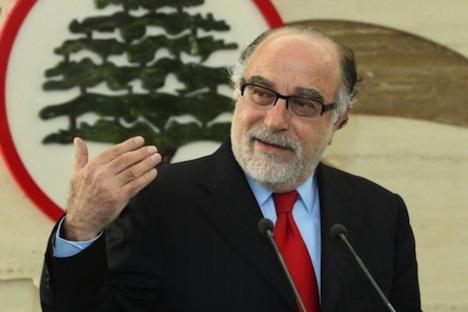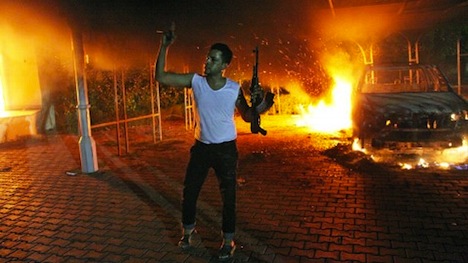Mohamad Chatah, a leader of the ‘March 14’ coalition in Lebanon and former ambassador to the United States, was killed in a Beirut car bomb blast on Friday in perhaps the most chilling political assassination in Lebanon since former prime minister Rafic Hariri was killed in 2005. ![]()
Just a couple of hours before his death, Chatah tweeted the following message out to the world:
#Hezbollah is pressing hard to be granted similar powers in security & foreign policy matters that Syria exercised in Lebanon for 15 yrs.
— Mohamad B Chatah (@mohamad_chatah) December 27, 2013
It’s a macabre epitaph for a man who spent his career pulling his country away from the impact of both Sunni and Shiite militants in favor of a vision of a modern, moderate and prosperous Lebanon. Chatah, who was born in Tripoli, the Sunni-dominant city in Lebanon’s north, was a top advisor to Hariri, and other relatively anti-Assad prime ministers, including Rafic Hariri’s his son Saad and Fouad Siniora. An economist who worked at the International Monetary Fund between the 1980s and 2005, Chatah served as Lebanon’s ambassador to the United States between 1997 and 2000. After Hariri’s assassination in 2005, Chatah returned to Lebanon, where he served as a vice-governor of Lebanon’s central bank and, from 2008 to 2009, its finance minister.
Since the 2005 assassination, Lebanese politics has been polarized between the ‘March 14’ coalition (comprised of moderate Sunnis and Maronite Christians) that opposed the role Syria played in internal Lebanese affairs and the ‘March 8’ coalition (comprised of mostly Shiite Lebanese, Greek Orthodox, other Sunnis and a minority of militant Maronites) that were more pro-Syria. Druze political leaders, the most prominent of which is Walid Jumblatt, are often play the determining role in which coalition holds power. As Syria has descended into civil war, however, the two coalitions have taken increasingly strong positions over Syrian president Bashar al-Assad. Even as most of Lebanon’s political elite have strained to keep their country from being sucked into Syria’s violence, the ‘March 8’ coalition is much more sympathetic to Assad and the ‘March 14’ coalition much less so.
Chatah was certainly among the most vocal opponents of both Assad and of Hezbollah (حزب الله), the Shiite militia and political group that is now openly and notoriously working to support the Alwaite (a Shi’a sect) Assad regime and has ties to the Islamic Republic of Iran, whose leadership is also Shiite. Sunni Salafists from Lebanon are also fighting openly and notoriously on behalf of chiefly Sunni anti-Assad rebels. Just last week, Chatah wrote an open letter to Iran’s new president Hassan Rowhani to help reduce Hezbollah’s role in Syria in the hopes of stabilizing Lebanon. It’s hard not to see Chatah’s death as a direct message from Assad supporters to the ‘March 14’ coalition.
Chatah was buried earlier today amid anti-Hezbollah chants, and Saad Hariri blamed Hezbollah directly on Friday:
“Those who assassinated Mohammad Shatah are the ones who assassinated Rafik Hariri; they are the ones who want to assassinate Lebanon,” the former prime minister said.
“The suspects are those who are running away from international justice and refuse to appear in the Special Tribunal for Lebanon; they are the ones opening the window of evil and chaos to Lebanon and the Lebanese and are drawing regional fires,” he added…. “Anger exists and we are heartbroken and we will remain heartbroken. But wisdom is needed so that we can build the Lebanon we dream of,” he added.
Though Lebanon hasn’t descended into outright war, sectarian tensions are rising: Continue reading The legacy of Mohamad Chatah — and his tragic assassination

